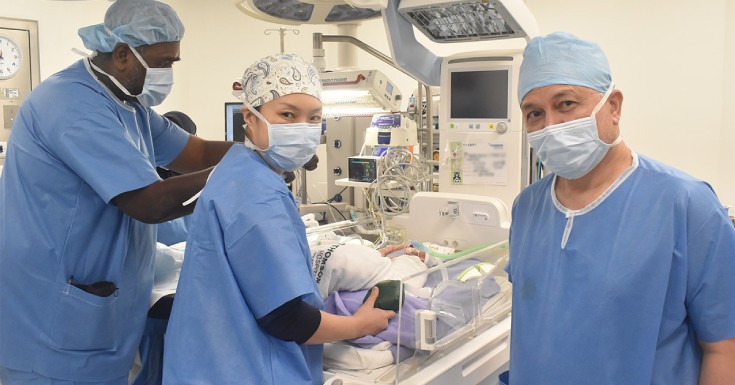Pregnancy Related Complications
Women may suffer from various conditions during pregnancy. In this article, learn about the most common issues related to pregnancy and the steps you can take to prevent and treat them.
Women experience different obstetrics and gynaecological conditions throughout their lives. These start from their first menstruation, then advances to the reproductive and pregnancy stages and finally, menopause. Of these stages, the reproductive and pregnancy stages are of particular importance, as complications during pregnancy and child birth are a leading cause of death and disability among women of reproductive age in developing countries.
Some of the most common complications related to pregnancy include iron deficiency anaemia (IDA) and threatened and habitual miscarriage. Given the widespread occurrence of these conditions with pregnant women, it is important to focus attention on proper pre-natal care and the importance of seeking counsel from health care professionals to avoid further complications or health issues for both the mother and the baby.
Table of Contents
Iron Deficiency Anaemia
Anaemia occurs when the blood lacks adequate healthy red blood cells. In IDA, the body does not have sufficient iron to produce enough haemoglobin, which is the part of the red blood cells that enables them to deliver oxygen throughout the body.
“Severe or untreated IDA in pregnancy can lead to subsequent problems such as a pre-mature or low-birth-weight baby, postpartum depression or a child with development delays or birth defects ,” Dr Kiren Sidhu, Consultant Obstetrician and Gynaecologist emphasized.
Threatened and Habitual Miscarriage
A threatened miscarriage is a condition, usually characterized by vaginal bleeding, which suggests that a pregnancy may end before the first trimester. A recurrent miscarriage refers to the spontaneous loss of three or more consecutive pregnancies in the first trimester, with the same biological father.
The causes of miscarriage are not well understood. However, most pregnancy losses result from chromosomal or genetic abnormalities (maternal and paternal), and are random events.
Signs and symptoms of a miscarriage may include:
- Vaginal spotting or bleeding
- Pain or cramping in the abdomen or lower back
- Fluid or tissue passing from the vagina
It is important to note that most women who experience vaginal spotting or bleeding in the first trimester go on to have successful pregnancies. However, women should still consult their healthcare provider when experiencing these symptoms during pregnancy.
“Vaginal bleeding is characteristic of threatened miscarriage, suggesting that a pregnancy may end before the first trimester,” explained Prof Dr Mohd Hashim Omar, Consultant Obstetrician and Gynaecologist.
The risk of miscarriage increases with:
- Age (maternal and paternal) – Women older than 35 years of age have a higher risk of miscarriage than do younger women. At age 35, women have about a 20 percent risk. At age 40, the risk is about 40 percent, and increases to about 80 percent at age 45. Paternal age may also play a role. Some research also suggests that women who become pregnant by older men are at a slightly higher risk of miscarriage.
- Smoking, drug and alcohol use
- Number of previous miscarriages
- Other health conditions – this includes chronic conditions such as diabetes or uterine or cervical problems.
To reduce the risk of future miscarriages, the following steps can be taken:
- Early, comprehensive pre-natal care for the prevention of not just miscarriages but also other complications of pregnancy.
- Treating the underlying cause of miscarriages such as chromosomal or genetic abnormality.
- Oral hormonal therapy such as dydrogesterone, which mimics the effects of progesterone. This helps to regulate the healthy growth and shedding of the endometrium and may further reduce miscarriage rates.
Early and comprehensive pre-natal care and education is crucial to address underlying issues and help prevent these pregnancy-related conditions. For miscarriages, oral hormonal therapy such as drydogesterone, which mimics the effects of progesterone, helps to regulate the healthy growth and shedding of the endometrium and thus may reduce miscarriage rates . Women are also recommended to take iron supplements to prevent IDA, thereby further enhancing their pre-natal care.
Improving Maternal Health
Coming back to the issue of maternal death, the United Nations (UN) explains maternal death as the death of a woman while she is pregnant or if she dies within 42 days of pregnancy termination, irrespective of the duration and site of the pregnancy, from any cause related to or aggravated by pregnancy or its management. The maternal mortality ratio (MMR) is the ratio of the number of maternal deaths during a given time period per 100,000 live births during the same time period.
The UN notes that while the MMR has dropped by 45 percent between 1990 and 2013 globally, from 380 to 210 deaths per 100,000 live births, the MMR in developing regions is still 14 times higher than in developed regions. Recognizing the urgency of this issue, the UN has set one of the Millennium Development Goals (MDG) as improving maternal health. In line with this, the target is to reduce the MMR by three quarters, between 1990 and 20159.
Malaysia is working progressively towards achieving the goal of improving maternal health in line with the MDG. Preliminary data in 2009 showed that the MMR in Malaysia was at 28 per 100,000 live births, down from 44 per 100,000 live births in 1991. The target by 2015 is to reduce the MMR further to 11 per 100,000 live births.
Article is contributed by Abbott, a global healthcare company devoted to improving life through the development of products and technologies that span the breadth of healthcare. Abbott is committed to raising awareness and increasing education on pregnancy-related complications in support of Malaysia’s efforts towards achieving the Millennium Development Goals. Abbott’s commitment to women’s health in Malaysia is in line with the company’s global Women First™ program, which aims to advance the knowledge, understanding and treatment of obstetrics and gynaecological conditions through education and training opportunities for the public and healthcare professionals.





















Leave a comment